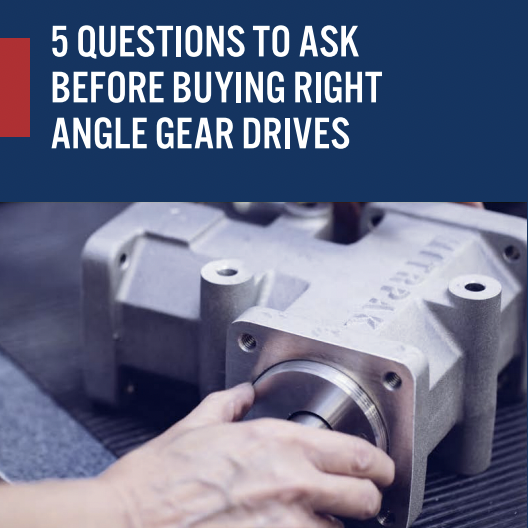Spiral bevel gearboxes are often specified in challenging locations such as washdown processing areas, or, conversely, where the end-use environment must avoid contamination from an open drive. Drives are offered by a wide variety of vendors, large and small. They’re specified and bought by design engineers and purchasing agents for original equipment manufacturers (OEMs), as well as by in-plant maintenance and repair operations (MROs).
How can these specifiers and purchasers obtain the most suitable drives for their needs? Here are five key questions to ask prospective vendors in determining whether their spiral bevel gear drives are the optimum choice for your unique application.
1. Are they suited for use in challenging environments?
Many applications require specialized drive materials, components, or designs to deliver
required performance in difficult environments. For best results, designers and purchasers should describe end-use conditions to vendors carefully. Where exactly will the drive be located? Note any possibilities of contamination, either from the environment to the drive or vice-versa. Warn of temperature extremes. Can gearing be open, or are closed housings mandated? Must any special governmental regulations or industry association standards be met? What service life is expected? What’s been the previous experience of similar drives for this use?
2. Have they been designed for field maintenance, repair, and rebuild?
Properly assembled and sized for the application, a well-made spiral bevel gear drive should last for years in all but the most difficult applications. If a drive develops trouble or fails after warranty, depending on age and condition it is often most cost-effective to purchase a new unit. However, in some cases it may still be worth considering maintenance, repair, or rebuild instead of replacement. Before you buy, ask vendors if such services are possible with their products.
3. How do they minimize noise and backlash?
Most designers and end users like their gearsets as quiet as possible. Noisy gears actually may signify mechanical deficiencies that contribute to poor performance and shortened drive life. Plus even where an unusually hushed environment is not a prime consideration, quiet gears provide a perception of high quality and superior functionality.
The type of gear you choose can depend on the gear performance you require. For lower speeds and lighter loads, straight bevel gears may be adequate, although their abrupt transfer from tooth to tooth tends to create higher impact stress and greater noise.
By contrast, spiral bevel gears are designed so that their curved teeth come into contact gradually. You get higher tooth-to-tooth contact covering a greater surface area. This allows well-made spiral bevel designs to offer smooth, quiet operation, even at high speeds and greater load capacities.
When comparing different spiral bevel designs, complex considerations determine the final amount of noise emitted by any given gearset. One prime factor: backlash. This is defined as the distance between meshing gear teeth. All else being equal, the greater the backlash, the louder the impact when gear meets gear. A critical question: can your drive vendor make the adjustments required to minimize backlash?
Most manufacturers assemble their gears to a “loose” distance. They then close the gap just enough to get minimally acceptable tolerance by locking each gear permanently into place with a shim or retaining ring. However, even a slight variation in the manufacturing process can substantially increase the backlash on an individual gearset.
One exception is the MITRPAK® spiral bevel gear design. It eliminates shims and rings. Instead, its unique adjustable locknut allows each gearset to undergo extremely precise final adjustment by hand. Result: absolutely minimal backlash and the smoothest, quietest possible operation.
4. Can they be ordered in sizes and ratings for specific applications?
Different jobs demand different drives. Look for vendors that are willing to discuss your precise application, then offer options in terms of sizes and ratings that can deliver high performance and optimized drive service life within the parameters your job generates.
Pay particular attention to suggested torque ratios. These ratings are based on revolutions per minute under a given horsepower. In an all-too-common scenario, a customer may underestimate the amount of torque a drive will routinely encounter on the job. Suppliers sometimes discover that their drives rated for 190 inch pounds of torque are instead running at 400 inch pounds! This is bad news, since each drive is rated for an ultimate static torque. If operation frequently exceeds recommended levels of torque and/or horsepower, a good drive may still operate acceptably for some time. However, eventually, teeth wear; bearings fail; roll pins fatigue, and then shear.
Make a preliminary attempt to spec your drive by consulting the vendor’s catalog or Web site. Then, especially if your requirements seem at all out of the ordinary, contact the vendor or distributor. At a minimum, a good vendor should be willing to work closely with you, ensuring that the drive and components you select match the requirements of the work you want the drive to do.
5. Can they be customized for my application?
In many cases, a spiral bevel gear drive is much more than a commodity part. It’s a complex machine that’s precisely engineered for your exact needs. If your application is at all out of the ordinary, it’s crucial to find a vendor that provides problem-solving expertise and customization. For OEMs, this helps cut costs and design time, simplifies the design and engineering process, and reduces risk. For MROs, it helps ensure greater asset availability. And for both OEMs and MROs, it improves ultimate performance and extends equipment life.
Vendors willing to undertake specialized designs can meet specific performance requirements by customizing any of the following gear drive components:
• Housings
• Gear materials
• Roll pins/dowel pins
• Plating
• Locknuts
• Seals
• Shafts
• Bearings
• Lubricants
These are just a few considerations before you order a spiral bevel gear drive. Contact us to learn more about how Lampin goes beyond precision to meet your needs.

